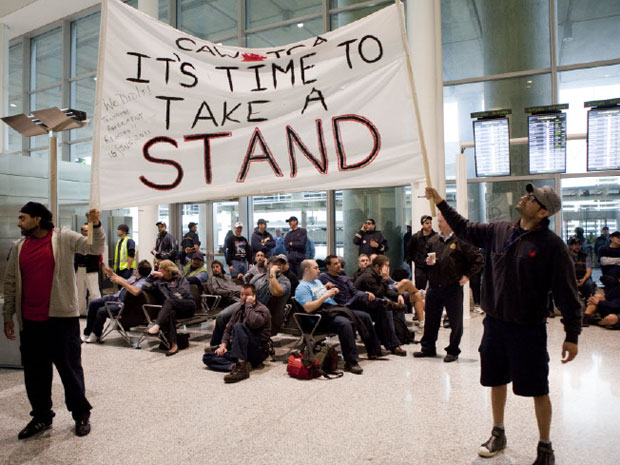On Labour Day weekend a friend of mine asked me, in regards to the labour movement, what can people do to fight back against the social injustices in our society? How can people effectively implement change? The directness of this question made me think that too often we are focused on analytical questions and not enough on what to do about all the terrible things in this world. So I quickly came up with four things you can do to start to fight back.
Join a union. Having a voice at work not only allows you and your fellow co-workers to fight for material gains and it makes the lines clear between management and workers. Unions are also lessons in collective struggle. If you and your co-workers stick together and organize strategically you can beat back aggressive employers and make your workplace more tolerable. If you can’t immediately form a legally recognized union, for whatever reason, consider forming a minority union, a solidarity union, an association or even a network. Something that allows you and your co-workers and allies to get together and talk about and organize around workplace issues is better than nothing.
If you are in a union get involved and push it to its maximum potential. Find and form political alliances in your local and push through progressive policies. Make sure your union has strong anti-racist, anti-sexist, anti-homophobic and anti-transphobic policies. More importantly though, make sure that in practice your union is diverse, welcoming and supportive. This also means that you should fight for more democratic policies and practices in your local and national union. Make sure that your union is supporting local and international political projects rather than simply charitable endeavors. Unions have lots of money that could be put to good political use and is often wasted. Have a clear and strategic plan for growing and strengthening your union and the working class in general. Run for elected office in your local. Insist that your union spend more on organizing the unorganized. Make sure your union has a plan to develop the political consciousness of its own members. Create rank and file networks and connections with other locals so that you can coordinate efforts to make your union the most effective it can be. Unions are by and large not revolutionary organizations, but they are working class organizations that if steered into a more progressive place can create a bigger space for radicals to agitate for the systematic change that is truly needed.
Join an anti-capitalist organization. Organizing issue by issue without linking those issues to a broader critique of capitalism opens the door for reactionary politics to appropriate and benefit from your work. Capitalism is extremely flexible and can absorb most single-issue critiques into its terrible bosom of exploitation and profit. If we want to build a new world, with new values and truly equitable and just practices then we need to oppose capitalism. We need to collectively organize for collective change. We need to build a mass movement against capitalism and towards a collective democratic future. This will not happen spontaneously nor will it happen in the short term. However, if we organize strategically with long term social change in mind then the struggles of today will lay the foundation for meaningful social change. Being in an explicitly anti-capitalist organization is the only rational thing to do. Make sure this organization is publicly active, runs effective campaigns, is welcoming and empowering, democratic and is able to link its anti-capitalist perspective to issues people actually care about. Make anti-capitalism digestible and rational to everyday people. If all your organization does is talk about 1917 in secret perhaps it is time to find another anti-capitalist group to join.
Join or start a reading circle. It is really important to be an engaged activist at work and in your community. Practicing radical politics is the best school you could ever attend. However, don’t completely discount things such as reading circles. They allow you a bigger space to talk about the issues that inform your struggle. You don’t need to read the heaviest academic tomes for them to be effective, often popular articles or short introductory books are enough to open up space to discuss and develop radical ideas. Reading circles are also places in which you can develop a shared political perspective. They challenge the notion that intellectual political development is an individual process. They allow people to build up the strength and fortitude to be comfortable holding minority viewpoints. Reading circles are important in raising political consciousness and developing a shared vision of the future.
These ideas come from a perspective of how do we organize strategically for change. This is not a complete list and it doesn’t preclude the many other points I have missed, rather, I hope to spark a conversation about what people should be doing.



